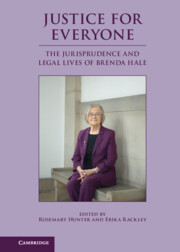Book contents
- Justice for Everyone
- Justice for Everyone
- Copyright page
- Contents
- Figures
- Tables
- Contributors
- Acknowledgements
- Table of Cases
- Table of Legislation
- Table of International Treaties and Conventions
- Brenda Hale Bibliography
- Part I Introduction
- Part II Personal Reflections
- Part III Academic
- Part IV Law Commissioner
- Part V Judge
- Judicial Leadership
- 11 Brenda Hale
- 12 Assessing Lady Hale’s Impact on the UK’s Final Appeal Courts
- 13 The Qualities of Lady Hale’s Legal Reasoning
- 14 On Personhood for Everyone
- 15 Lady Hale and Access to Justice
- 16 Lady Hale in the South African Courts
- Family Law and Children’s Rights
- Human Rights and the State
- Private Law and the Individual
- Part VI Creative Encounters
- Index
14 - On Personhood for Everyone
Brenda Hale’s Jurisprudence and Her Institution-Building
from Judicial Leadership
Published online by Cambridge University Press: 05 May 2022
- Justice for Everyone
- Justice for Everyone
- Copyright page
- Contents
- Figures
- Tables
- Contributors
- Acknowledgements
- Table of Cases
- Table of Legislation
- Table of International Treaties and Conventions
- Brenda Hale Bibliography
- Part I Introduction
- Part II Personal Reflections
- Part III Academic
- Part IV Law Commissioner
- Part V Judge
- Judicial Leadership
- 11 Brenda Hale
- 12 Assessing Lady Hale’s Impact on the UK’s Final Appeal Courts
- 13 The Qualities of Lady Hale’s Legal Reasoning
- 14 On Personhood for Everyone
- 15 Lady Hale and Access to Justice
- 16 Lady Hale in the South African Courts
- Family Law and Children’s Rights
- Human Rights and the State
- Private Law and the Individual
- Part VI Creative Encounters
- Index
Summary
After having been appointed a ‘Law Lord’, Brenda Hale wrote an essay asking the question: ‘Am I Really a Law Lord?’. Using the occasion of her entré into the higher echelons of the English judiciary, Lady Hale puzzled about the application of the Appellate Jurisdiction Act of 1876, by which she had gained her position. Written with a canny mix of serious inquiry into the case law on women’s equality and tongue-in-cheek commentary, Lady Hale explained the terms of the 1876 statute. Parliament had authorised the English monarch to appoint ‘qualified persons’ to be Lords of Appeal in Ordinary – if such individuals met the qualifications of service for two years or more as a High Court judge, or fifteen years as a barrister and, in some instances, as a solicitor. When enacted in 1876, women in England could not be lawyers, let alone judges. The issue Lady Hale raised was whether the term ‘qualified persons’ was limited to men or could – and should – be read to welcome a broader group of people who since 1876 had, by dint of social and political movements, succeeded in at least some respects in obtaining law’s recognition as ‘persons’. To answer, Lady Hale analysed relevant statutory and common law precedents and integrated the history of decisions on women’s rights in the UK with decisions in the United States Supreme Court.
- Type
- Chapter
- Information
- Justice for EveryoneThe Jurisprudence and Legal Lives of Brenda Hale, pp. 143 - 152Publisher: Cambridge University PressPrint publication year: 2022

